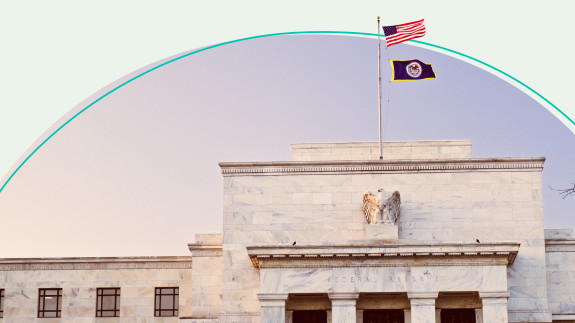How the Federal Funds Rate Affects Your Wallet
 Design: theSkimm | Photo: iStock
Design: theSkimm | Photo: iStockFederal Reserve chair Jerome Powell is the face of a lot of gov money moves that affect you. Like changing the federal funds rate — an important percentage that influences everything from inflation to what you pay for loans.
When things don't look so hot, the Fed can lower rates to encourage people to borrow, spend, and invest...which can help boost the economy. Since COVID-19 had some serious economic side effects, the Fed lowered rates to essentially zero in March 2020. On the other hand, the Fed can increase interest rates when it thinks the economy's doing well enough to handle higher borrowing costs. This can also slow down inflation because higher interest rates encourage people to save their money instead of spending it.
In mid-December, Powell announced that the Fed's considering three rate hikes in 2022. Plus another three in 2023. And during its January meeting, the Fed announced that it's ready to take action, potentially raising interest rates as early as March 2022. Here's what that could mean for your wallet.
Is ‘become a homeowner' on your to-do list?
-
Buying when interest rates are low can make that dream less expensive. And vice versa. The fed funds rate isn't directly tied to mortgages, but it can influence them.
-
Mortgage rates were at historic lows in 2021, but will likely be on the rise this year as interest rates increase. To make sure you get the best deal — whenever you buy — compare rates from multiple lenders.
-
FYI, lenders got pickier about who they did business with during the pandemic to protect against people defaulting on their loans. They've started to loosen up. But it's never a bad idea to work on your credit score.
Do you already own a home?
-
Refinancing to a lower rate (before they start rising) could help you save on interest charges over the life of the loan. If this money move has been on your to-do list, get moving.
-
Heads up: Swapping out your old home loan for a new one may mean paying closing costs again. Do some HW to make sure you'll save more than you spend.
Are you working on paying off credit card debt?
-
When the federal funds rate goes up, the interest on variable-rate cards can, too. That makes it more expensive — and probably longer — to pay off your balance.
-
Make a plan to pay off your credit card debt ASAP before the rate hikes start. Pro tip: call your credit card issuer now and ask for a lower interest rate.
Do you like making money on your money?
-
Good news: When rates are high, banks may pay you a little more to keep money in your savings account. (Although banks tend to be slower on raising interest rates on your savings than increasing the rate on your credit card.) If you're shopping for a new place to park your money, compare rates at online banks. They usually offer better interest rates than old-school options.
-
If you don't need your money for a while, investing gives it a chance to grow even faster.
theSkimm
The Fed's ready to get this interest-hike party started to help combat inflation. That means you could see higher mortgage rates and pay more to carry credit card debt. But it's good news for savers, who might get paid a little more to keep their money in the bank.
Updated Jan. 26 to include new info on the Fed's plan to raise rates.
Article Credit: the Skimm
